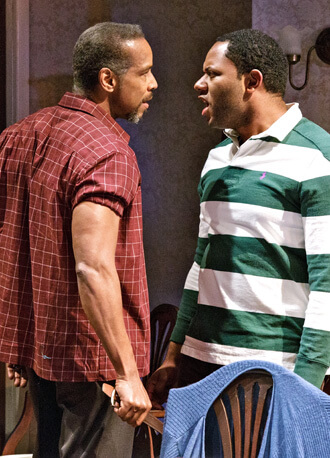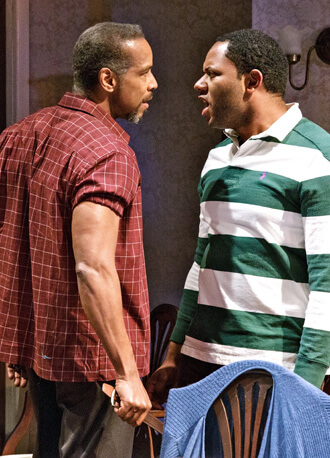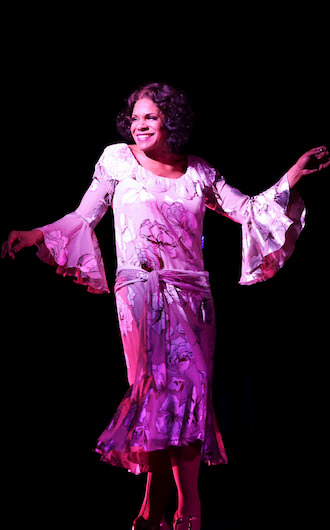S. Epatha Merkerson in Billy Porter’s “While I Yet Live,” directed by Sheryl Kaller, at the Duke on 42nd Street through October 31. | JAMES LEYNSE
Have you noticed the boomlet in bio-shows about gay, tormented, and ultimately triumphant African-American males on the New York boards this season?
Last month, “Bootycandy” wowed audiences with its darkly comic take on growing up black and gay, presumably set in Cincinnati where the playwright Robert O’Hara was raised. “Mighty Real” brought the delirious music of disco queen Sylvester to life, laced with reflections about his boyhood in LA and career in San Francisco.
And now there’s “While I Yet Live,” the semi-autobiographical play by Broadway star Billy Porter about, well, growing up black and gay in Pittsburgh. But unlike its exuberantly entertaining predecessors, Porter’s work is a confessional, arduous kitchen-sink drama that some have compared to “August: Osage County.”
In confronting a wretched past, Billy Porter finds hope for the future
The church figures heavily in the lives of all three young men, though tragically, so does sexual abuse by a predatory male adult. “While I Yet Live” focuses on this horrific issue as one that drives Calvin (a stand-in for Porter) from his home and lets him off the hook while his younger sister, Tonya, cares for their mother, Maxine, gradually losing motor control due to cerebral palsy.
Porter has described the play as “a love letter” to the strong women who raised him when any father figure was scarce. Yet it registers as a long and furious letter indeed, smudged by tears. Catharsis may be a primary force behind this bold endeavor.
Helmed by Sheryl Kaller (who did a fine job with another multi-generational play, “Mothers and Sons”), the drama centers on Calvin’s alternately bickering and loving family preparing for Thanksgiving dinner in various rooms of a large, well worn home (nicely rendered by James Noone). Tonya addresses the audience, setting the tone by reciting the rules of the house: “Children are to be seen and not heard. Spare the rod, spoil the child. Stop crying ‘fo I give you sumtin to cry about.”
In an upstairs bedroom, Maxine is having a heart-to-heart with dear friend Eva, who suffers from a terminal illness too terrible to name. Grandma Gertrude and Aunt Delores are busy in the kitchen preparing dinner, arguing about chittterlings. Stepfather Vernon is watching the Steelers game in the living room. Meanwhile, the sassy, effeminate Calvin has another run-in with his mother about his sexuality — she’s ashamed and in denial and doesn’t seem to care that the church kids call her son “Fairy Dust.”
Kevyn Morrow and Larry Powell in “While I Yet Live. | JAMES LEYNSE
Soon the frayed ties that have barely kept the family together come undone, and before you know it, 17-year-old Calvin throws some belongings into a knapsack and splits. For good.
The action fast-forwards seven years later, and then jumps a few years after that. Some family members have passed, though occasionally they come back as ghosts. Tonya is now the backbone of the family. Calvin, who has moved to New York and is busy being a Broadway performer, returns for the occasional quick visit, in some ways a ghost himself.
Although Porter does not appear in this heartfelt drama — the gifted Tony-winner is still shaking his booty in “Kinky Boots” on Broadway — Kaller has assembled an impressive cast, led by the sublime S. Epatha Merkerson as the Bible-wielding Maxine. Lillias White (Gertrude), Elain Graham (Delores), and Sharon Washington (Eva) bring a poignant urgency to their roles. Kevyn Morrow adds startling shades of humanity to the monstrous stepfather. And Sheria Irving’s Tonya transitions convincingly from bratty little sister to savvy head of household.
Unfortunately, the weak link is Larry Powell, who plays Calvin like he’s in a “Saturday Night Live” sketch, conveying little of the churning pain or rage required for such a tortured, complex character.
You can’t help but admire the courageous and ambitious “While I Yet Live,” which delivers some truly affecting moments. The heavily plotted, overstuffed work, however, is in need of some serious editing. The piece is a dizzying swirl of disparate themes — family dysfunction, the dangers of religion, the fickleness of God, being true to oneself, overcoming sexual abuse and severe illness, guilt over neglecting elderly parents, expressing love before its too late, the healing power of forgiveness, and so much more. There’s even a jarring reference to the terrorist attacks on 9/11.
What’s more, in addition to numerous bits of scripture, Porter has crammed so many truisms into the dialogue it feels as if co-written by Oprah Winfrey, who, as it happens, is mentioned multiple times. Platitudes like “Name it and claim it,” “Forgive yourself first,” and “Fake it till you make it” become mind-numbing after a while.
If only the creative team had heeded one of the wisest adages of all: “Less is more.”
WHILE I YET LIVE | Primary Stages | The Duke on 42nd Street, 229 W. 42nd St. | Through Oct. 31: Tue.-Thu. at 7 p.m.; Fri.-Sat. at 8 p.m.; Sat. at 2 p.m.; Sun. at 3 p.m. | $70 at PrimaryStages.org or 646-223-3010 | 2 hrs., 30 mins., with intermission




































